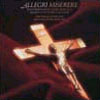Allegri Miserere; Mundy Vox Patris caelestis; Palestrina Missa Papae Marcelli
View record and artist detailsRecord and Artist Details
Composer or Director: William Mundy, Giovanni Palestrina, Gregorio Allegri
Label: Gimell
Magazine Review Date: 7/2001
Media Format: CD or Download
Media Runtime: 69
Mastering:
ADD
Catalogue Number: CDGIM339

Tracks:
| Composition | Artist Credit |
|---|---|
| Miserere mei |
Gregorio Allegri, Composer
Alison Stamp, Soprano Gregorio Allegri, Composer Peter Phillips, Conductor Tallis Scholars |
| Vox patris caelestis |
William Mundy, Composer
Peter Phillips, Conductor Tallis Scholars William Mundy, Composer |
| Missa Papae Marcelli |
Giovanni Palestrina, Composer
Giovanni Palestrina, Composer Peter Phillips, Conductor Tallis Scholars |
Author:
The importance of this recording, one of the Tallis Scholars’ first, speaks for itself. Its re-release on the group’s in-house label more than 20 years on is of more than symbolic importance. Audibly a product of its time, it has aged very little even though The Tallis Scholars themselves do things rather differently nowadays, and sound quite different. It no longer seems so important that their female vocalists sound like boys, and the stratospherically high treble reaches of Mundy’s Vox patris caelestis would probably now be taken a notch lower. But from a technical standpoint this is probably the disc’s outstanding track, and it is a fine (if gargantuan) example of the post-Eton Choirbook idiom.
In the years since this recording was made, much has been written concerning Allegri’s Miserere – not least the authenticity of those famous high Cs (it appears that they are the result of a modern misreading of the version Mendelssohn smuggled from the Vatican); but without doubt they have become a part of the piece’s history as truly as the notes Allegri wrote. Like many latter-day favourites, the Miserere is essentially a vehicle for performance, and Alison Stamp’s treble wafting through Merton College chapel remains the disc’s most astonishing moment.
As to Palestrina’s Missa Papae Marcelli, I’m always surprised that it doesn’t get top billing here. That said, The Tallis Scholars’ subsequent Palestrina interpretations have greater depth, and for this particular Mass I prefer their live recording, done in 1994 (Gimell, 9/94): the tempos sacrifice less to the prevailing acoustic, the women sound like women, and the whole ensemble takes a more robust, less reverential view of the work.
What ages the disc most is precisely this aura of reverence (embodied also in the original cover design, which has been retained) applied to pieces as different as these. But as an early document of one of the most successful ensembles in its field, its significance can hardly be gainsaid
In the years since this recording was made, much has been written concerning Allegri’s Miserere – not least the authenticity of those famous high Cs (it appears that they are the result of a modern misreading of the version Mendelssohn smuggled from the Vatican); but without doubt they have become a part of the piece’s history as truly as the notes Allegri wrote. Like many latter-day favourites, the Miserere is essentially a vehicle for performance, and Alison Stamp’s treble wafting through Merton College chapel remains the disc’s most astonishing moment.
As to Palestrina’s Missa Papae Marcelli, I’m always surprised that it doesn’t get top billing here. That said, The Tallis Scholars’ subsequent Palestrina interpretations have greater depth, and for this particular Mass I prefer their live recording, done in 1994 (Gimell, 9/94): the tempos sacrifice less to the prevailing acoustic, the women sound like women, and the whole ensemble takes a more robust, less reverential view of the work.
What ages the disc most is precisely this aura of reverence (embodied also in the original cover design, which has been retained) applied to pieces as different as these. But as an early document of one of the most successful ensembles in its field, its significance can hardly be gainsaid
Discover the world's largest classical music catalogue with Presto Music.

Gramophone Digital Club
- Digital Edition
- Digital Archive
- Reviews Database
- Full website access
From £8.75 / month
Subscribe
Gramophone Full Club
- Print Edition
- Digital Edition
- Digital Archive
- Reviews Database
- Full website access
From £11.00 / month
Subscribe
If you are a library, university or other organisation that would be interested in an institutional subscription to Gramophone please click here for further information.




